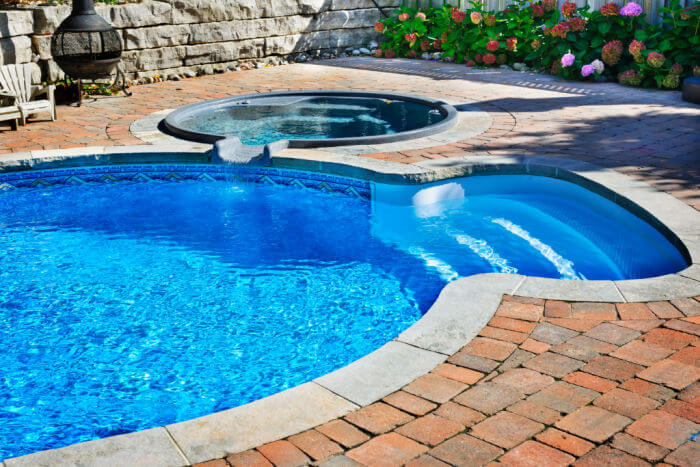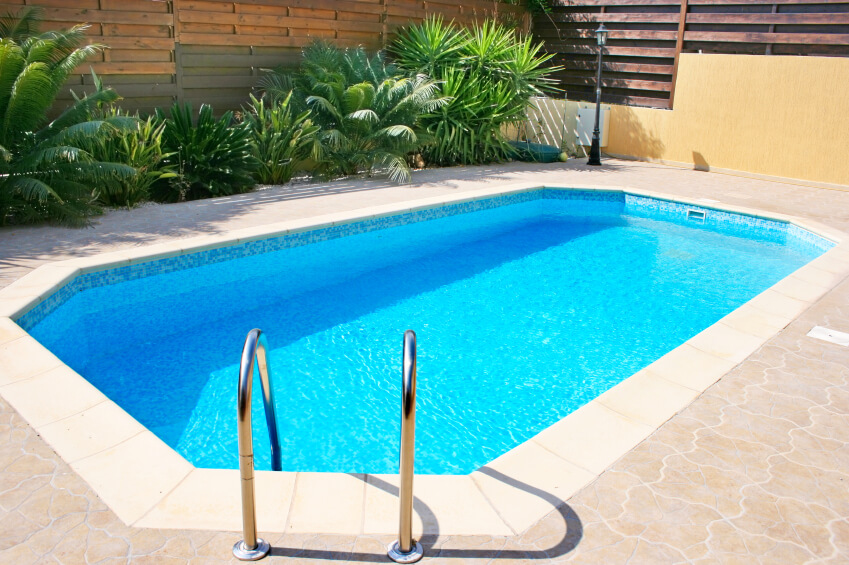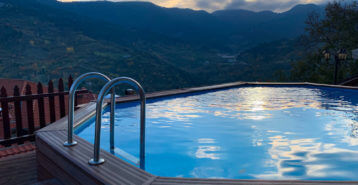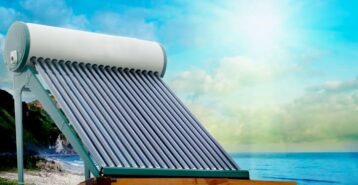Are you doing a home improvement project?
Modernize can pair you with three to four pros in your area, so you can compare options and save time and money.
Sunbathing, lounging on a floatie, or doing some laps in the pool are a favorite pastime, and when you can do it right in your backyard, you are the envy of the neighborhood. Pools have always been a popular feature to have in a home. But with more of us spending our time outside, it is becoming a premium feature. According to Realtor Magazine, homes that have a swimming pool can earn sellers up to $27,000 more on the resale price!
But swimming pools do not come without work. The magazine also states that it can cost homeowners between $3,000 and $5,000 a year just to maintain their pools, and there definitely a lot to learn for new homeowners. On this page, we break down what you need to know about pool maintenance, as well as what you need to do to keep your pool safe and looking beautiful for your family and friends to enjoy.
Types of Pools for Homes
Are you a first time homeowner and not sure what type of pool is best for your budget and needs? Different types of backyard swimming pools come with their own costs and potential to up your home’s resale value.
In-ground vs. Above Ground Pools
The names say it all when it comes to the types of pools available. You can install either an in-ground pool, which is built directly into the ground, or an above ground pool, which is portable and can be placed almost anywhere in your yard. Which type of pool is best for your budget and lifestyle?
When it comes to home value, in-ground pools are going to fetch a home a pretty penny. That is because it’s not cheap to install them. Builders and homeowners can spend anywhere between $28,000 and $55,000 to install an in-ground pool, and it can take weeks to complete the project. If you plan to also add an in-ground hot tub to pair with the pool, this will cost an additional $8,000 to $25,000. But according to Bankrate and HGTV, adding a pool to your home can increase your property’s value by as much as 8 percent.
On the other hand, above-ground pools are cheaper and faster to install. This is great if you have a smaller pool budget, but bear in mind that above ground pools are considered to be a temporary feature of the home and will not necessarily increase your home value. They are also much shallower, so if diving is your thing, an above-ground pool will not do the trick.
Saltwater vs. Freshwater Chlorinated Pools
Many people associate swimming pools with the strong smell of chlorine, but saltwater pools are gaining more popularity in recent years.
The main difference between the two types of pools is their chlorination process. As the name implies, saltwater pools use salt generators to sanitize the water. On the other hand, more traditional freshwater pools use chlorine tablets that are added to the pool on a regular basis.
There are pros and cons to both types of pools. Depending on which one you have, there will be different pool maintenance needs. Although chlorinated pools are more common in U.S. backyards than saltwater pools, saltwater pools tend to be easier to upkeep and lower maintenance. This is partly because the chemicals needed to maintain a saltwater pool are lesser and more affordable.
Swimming Pool Maintenance Tips
No matter what type you have, regular pool maintenance is necessary for any home with a backyard pool. You have to keep it clean and sanitized, making it safe for swimmers. While these tasks can be done by the homeowners DIY, some opt to hire a pool cleaning service to come weekly to check the various chemicals in the pool, clean the pool, add necessary chemicals for sanitizing, and other tasks. Having a professional handle your pool maintenance can not only save you time, but ensure the pool is safe and upkept correctly.
Find the Right Contractor for Your Project
Whether you’re ready to begin your project now or need some expert advice, our network of contractors are here to help. With a few simple questions, we’ll find the best local professionals for you

Using Pool Test Strips
There are important chemicals that make up your pool water. You can test the pool water weekly to ensure the chemicals are at the right levels, and that the water is safe to swim in. Simply hold the test strip in the pool water for 15 seconds and remove immediately. When using a test strip to check on the pool’s chemical levels, they should fall within the following*:
- pH: 7.2 to 7.6 (use baking soda to raise it and sodium carbonate or muriatic acid to lower it)
- Free chlorine: 1 and 3 ppm (can be adjusted using your pool’s generator)
- Salinity: 2,700 to 4,500 ppm
- Alkalinity: 80 to 120 ppm (use baking soda or muriatic acid to adjust)
- Stabilizer: 70 to 88 ppm
- Calcium: 200 to 400 ppm
* These numbers will vary according to your pool model; be sure to check with the manufacturer and follow their recommendations.
How to Maintain a Chlorinated Pool
To properly maintain a chlorinated pool (also known as a freshwater pool), build the following steps into your weekly, monthly, and yearly home maintenance routine:
- Twice weekly: Check your pool’s pH and free chlorine levels. Clean pool with skimmer for debris that has fallen in.
- Weekly: Clean the pool with a brush or a pool vacuum, shock the pool with chemicals (especially if you’ve had bad or hot weather), and add an algaecide.
- Monthly: Take a water sample to your preferred testing service.
- Twice a year: Clean the pool filter.
How to Maintain a Saltwater Pool
To properly maintain a saltwater pool, build the following steps into your weekly, monthly, and yearly home maintenance routine:
- Daily: Check your pool for debris that has fallen into the pool and clear it out with a skimmer. Also check your pump basket, as things can get sucked into there.
- Weekly: Check the pH and free chlorine levels.
- Monthly: Check the pool’s salinity, alkalinity, stabilizer and calcium.
- Quarterly: Check the salt water cell for scale and deposit build up. If it is clear, go ahead and reinstall it. If it is not, clean it with a high-pressure hose or mild acid wash.
How to Winterize Your Pool
For homeowners who live in areas that get cold in the winter, they will need to winterize their swimming pools. This prepares the pool to be unused for the winter months and be ready and clean when the temperatures warm up again. Pool experts suggest that homeowners close their pools when outside temperatures reach 60 degrees or less. Follow these pool maintenance tips to prepare your pool for winter:
- Check your pool’s chemical balances and make sure they fall within normal range.
- Clean the pool and filter.
- Shock your pool with a high dose of chemicals to sanitize the pool. Your manufacturer will have details on what your specific pool will need.
- Run the pump for 24 hours with an algaecide.
- Turn off and drain the pool.
- Remove all pool equipment and safely store it for the cold months.
- Plug and cover the pool and hot tub if you have one.
Pool Safety Tips
Having a pool not only takes work to enjoy, but it comes with a level of responsibility. Small children or people with disabilities can injure themselves in and around your pool, and slip and falls are not unheard of.
It is important as a pool owner to make sure you do what you can to make your swimming pool a safe and fun environment for your family and guests. Here are some pool safety tips:
- Install a pool fence. This will ensure that little ones cannot accidentally sneak in. Note that many cities require homes with pools to have fences. There are different types of fences, from more permanent iron fences to the popular netting fence to surround the pool.
- Install alarms. A security system can be used to go off when someone has entered the pool, when you are not intending on using it.
- Keep safety equipment nearby. We recommend owning a pool ring or reach stick and keep it near the pool should an accident occur.
- Keep chemicals stored away. Store pool chemicals and cleaning supplies away from where children and animals can access them, such as a locked shed.
- Keep the pool clean and monitor chemicals closely. Maintain your pool and keep it clean to ensure that family members and guests do not get sick.
- Buy a pool safety cover. If you live in an area where you do not use the pool all year round, consider installing a safety cover during the months the pool is not being enjoyed. This will also help keep debris out of the pool and make clean-up easier.
Find the Right Contractor for Your Project
Whether you’re ready to begin your project now or need some expert advice, our network of contractors are here to help. With a few simple questions, we’ll find the best local professionals for you
Reviews from Real Homeowners
Welcome to Homeowner Resources! We are the Modernize blog. Modernize pairs more than 3 million homeowners a year with pre-vetted contractors in their area. This blog started because we believe homeowners should know everything about their homes, from how their HVAC works to which front door colors they might love. On Homeowner Resources, you can find information on every part of your home, right down to how you can negotiate with contractors to get the best price. Here's more about the blog.
Need a contractor? Learn more about how Modernize finds the right pro for you.



